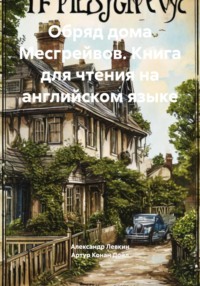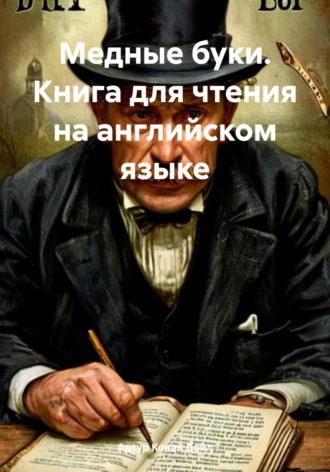
Полная версия
Медные буки. Книга для чтения на английском языке

Артур Конан Дойл
Медные буки. Книга для чтения на английском языке
Введение
Книга предназначена для изучающих английский язык с использованием текста произведения зарубежной классики, его транскрипции и соответствующей аудиокниги, озвученной носителем языка.
Для подготовки книги использована бесплатная электронная книга с публичного сайта Project Gutenberg и бесплатная аудиокнига с публичного сайта Librivox, озвученная носителем языка (David Clarke). Транскрипция, записанная символами международного фонетического алфавита, выполнена с помощью онлайн-переводчика английского текста в транскрипцию— toPhonetics компании Mu-sonic Ltd. Соответствующие ресурсы приведены в разделе "Использованные источники".
В данной книге приводится транскрипция текста рассказа А.К. Дойла «Медные буки» на английском языке. Текст рассказа разбит на небольшие фрагменты. Фрагменты пронумерованы порядковыми номерами (01, 02,…,42). После номера фрагмента приведены время начала и окончания аудиозаписи текста фрагмента в аудиокниге. Для каждого фрагмента подготовлена транскрипция текста, оформленная в виде иллюстраций с изображением транскрипции текста фрагмента.
Таким образом, чтение рассказа производится с «подсказками» в виде транскрипции и прослушиванием аудиокниги.
01. 00:00:09 – 00:01:03

“To the man who loves art for its own sake,” remarked Sherlock Holmes, tossing aside the advertisement sheet of The Daily Telegraph, “it is frequently in its least important and lowliest manifestations that the keenest pleasure is to be derived.

It is pleasant to me to observe, Watson, that you have so far grasped this truth that in these little records of our cases which you have been good enough to draw up, and, I am bound to say, occasionally to embellish,

you have given prominence not so much to the many causes célèbres and sensational trials in which I have figured but rather to those incidents which may have been trivial in themselves, but which have given room for those faculties of deduction and of logical synthesis which I have made my special province.”
02. 00:01:03 – 00:01:59

“And yet,” said I, smiling, “I cannot quite hold myself absolved from the charge of sensationalism which has been urged against my records.”

“You have erred, perhaps,” he observed, taking up a glowing cinder with the tongs and lighting with it the long cherry-wood pipe which was wont to replace his clay when he was in a disputatious rather than a meditative mood—

“you have erred perhaps in attempting to put colour and life into each of your statements instead of confining yourself to the task of placing upon record that severe reasoning from cause to effect which is really the only notable feature about the thing.”

“It seems to me that I have done you full justice in the matter,” I remarked with some coldness, for I was repelled by the egotism which I had more than once observed to be a strong factor in my friend’s singular character.
03. 00:01:59 – 00:03:19

“No, it is not selfishness or conceit,” said he, answering, as was his wont, my thoughts rather than my words. “If I claim full justice for my art, it is because it is an impersonal thing— a thing beyond myself.

Crime is common. Logic is rare. Therefore it is upon the logic rather than upon the crime that you should dwell. You have degraded what should have been a course of lectures into a series of tales.”

It was a cold morning of the early spring, and we sat after breakfast on either side of a cheery fire in the old room at Baker Street. A thick fog rolled down between the lines of dun-coloured houses, and the opposing windows loomed like dark, shapeless blurs through the heavy yellow wreaths.

Our gas was lit and shone on the white cloth and glimmer of china and metal, for the table had not been cleared yet.

Sherlock Holmes had been silent all the morning, dipping continuously into the advertisement columns of a succession of papers until at last, having apparently given up his search, he had emerged in no very sweet temper to lecture me upon my literary shortcomings.
04. 00:03:19 – 00:05:03

“At the same time,” he remarked after a pause, during which he had sat puffing at his long pipe and gazing down into the fire,

“you can hardly be open to a charge of sensationalism, for out of these cases which you have been so kind as to interest yourself in, a fair proportion do not treat of crime, in its legal sense, at all.

The small matter in which I endeavoured to help the King of Bohemia, the singular experience of Miss Mary Sutherland, the problem connected with the man with the twisted lip, and the incident of the noble bachelor, were all matters which are outside the pale of the law.

But in avoiding the sensational, I fear that you may have bordered on the trivial.”
“The end may have been so,” I answered, “but the methods I hold to have been novel and of interest.”

“Pshaw, my dear fellow, what do the public, the great unobservant public, who could hardly tell a weaver by his tooth or a compositor by his left thumb, care about the finer shades of analysis and deduction! But, indeed, if you are trivial, I cannot blame you, for the days of the great cases are past.
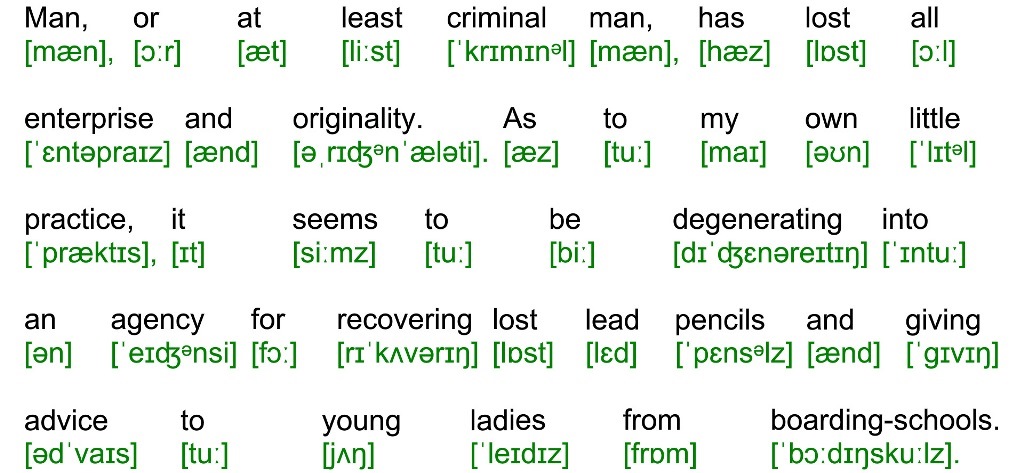
Man, or at least criminal man, has lost all enterprise and originality. As to my own little practice, it seems to be degenerating into an agency for recovering lost lead pencils and giving advice to young ladies from boarding-schools.
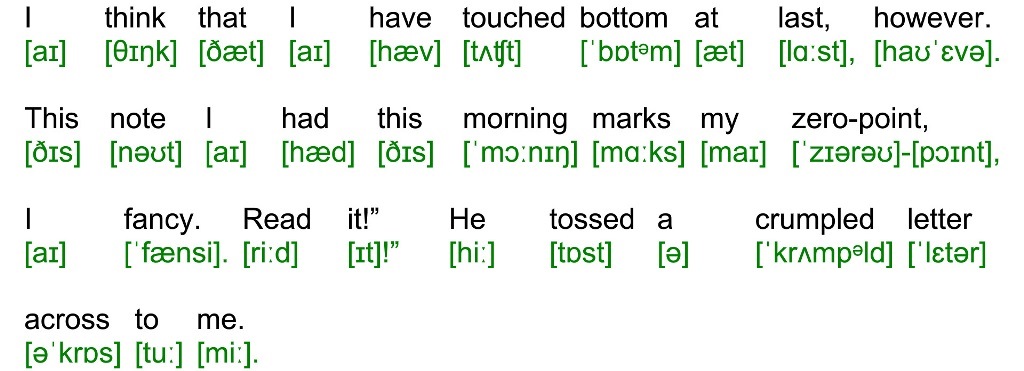
I think that I have touched bottom at last, however. This note I had this morning marks my zero-point, I fancy. Read it!” He tossed a crumpled letter across to me.
05. 00:05:03 – 00:06:01

It was dated from Montague Place upon the preceding evening, and ran thus:
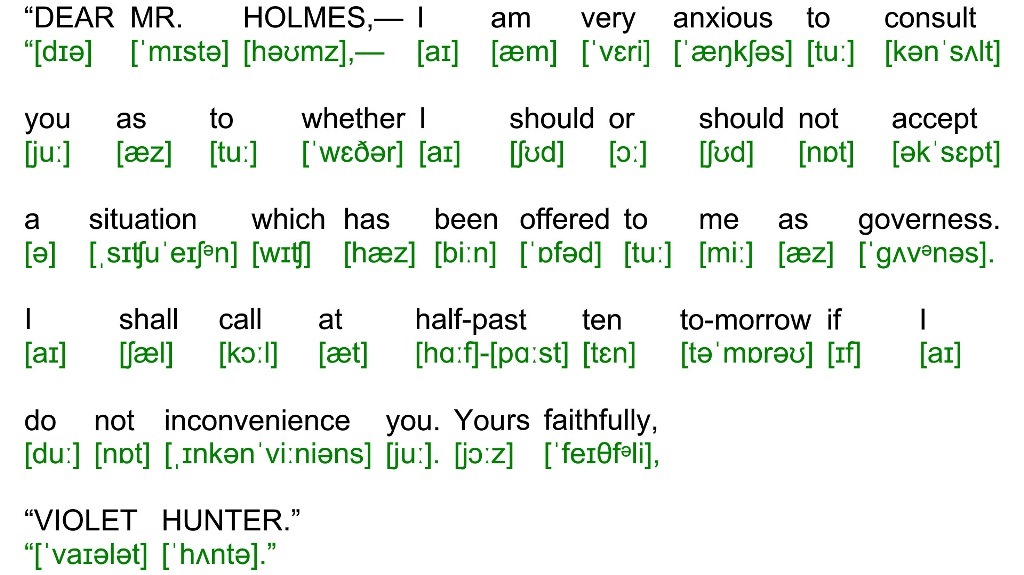
“DEAR MR. HOLMES,– I am very anxious to consult you as to whether I should or should not accept a situation which has been offered to me as governess. I shall call at half-past ten to-morrow if I do not inconvenience you. Yours faithfully,
“VIOLET HUNTER.”
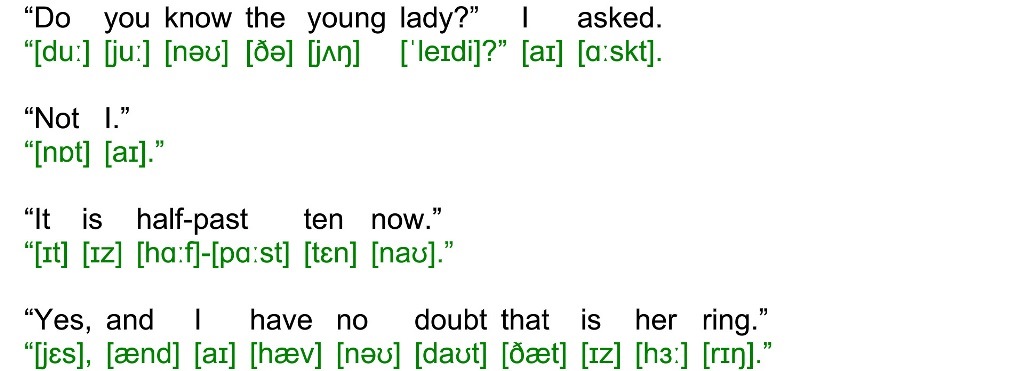
“Do you know the young lady?” I asked.
“Not I.”
“It is half-past ten now.”
“Yes, and I have no doubt that is her ring.”
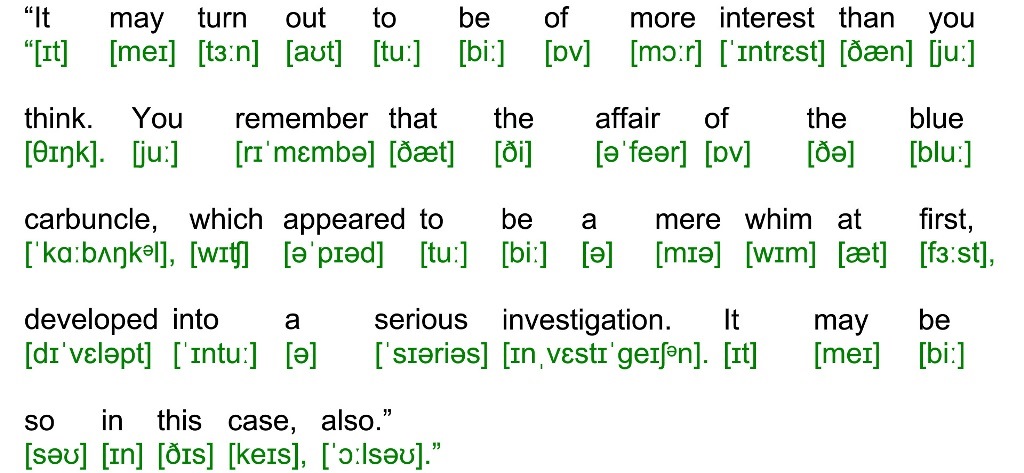
“It may turn out to be of more interest than you think. You remember that the affair of the blue carbuncle, which appeared to be a mere whim at first, developed into a serious investigation. It may be so in this case, also.”

“Well, let us hope so. But our doubts will very soon be solved, for here, unless I am much mistaken, is the person in question.”
06. 00:06:01 – 00:06:57
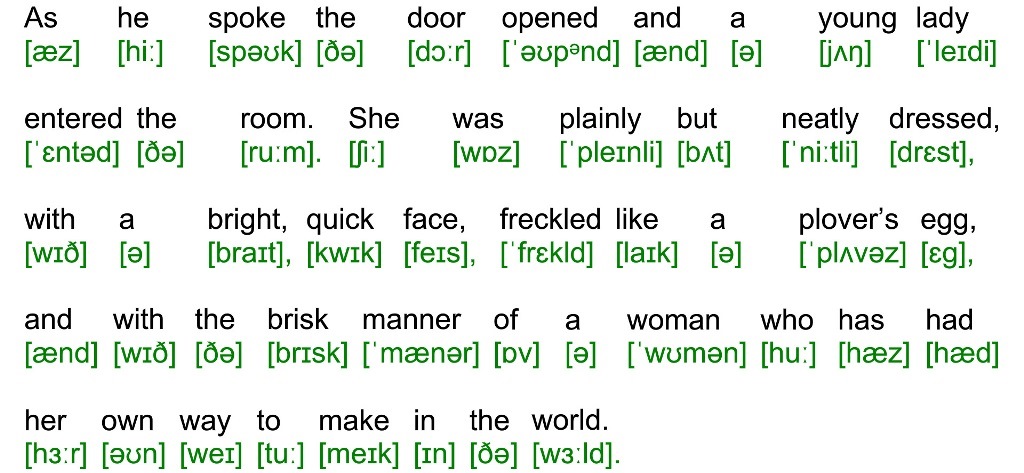
As he spoke the door opened and a young lady entered the room. She was plainly but neatly dressed, with a bright, quick face, freckled like a plover’s egg, and with the brisk manner of a woman who has had her own way to make in the world.
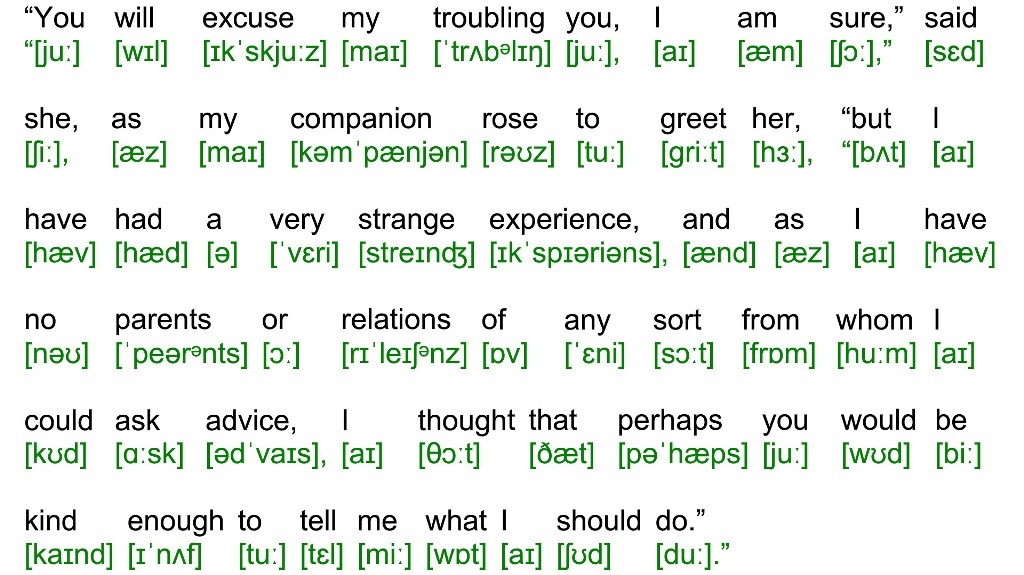
“You will excuse my troubling you, I am sure,” said she, as my companion rose to greet her, “but I have had a very strange experience, and as I have no parents or relations of any sort from whom I could ask advice, I thought that perhaps you would be kind enough to tell me what I should do.”

“Pray take a seat, Miss Hunter. I shall be happy to do anything that I can to serve you.”
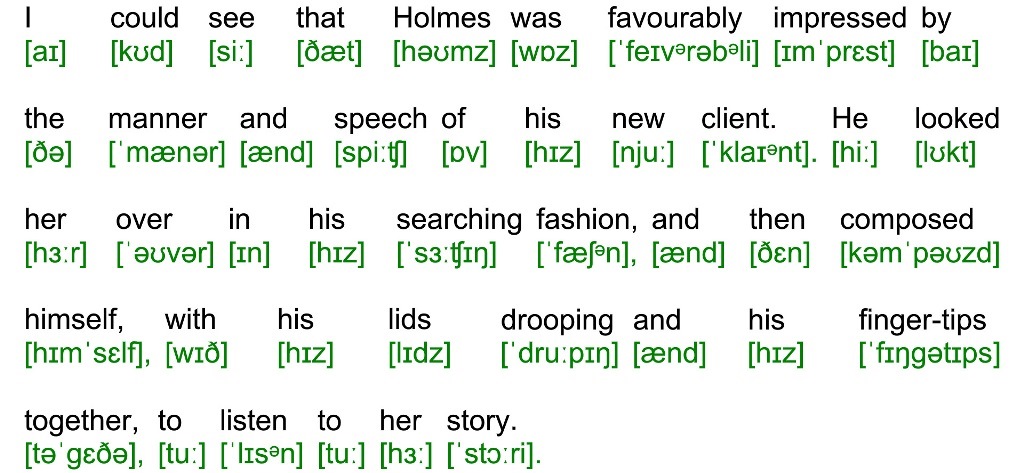
I could see that Holmes was favourably impressed by the manner and speech of his new client. He looked her over in his searching fashion, and then composed himself, with his lids drooping and his finger-tips together, to listen to her story.
07. 00:06:57 – 00:07:59
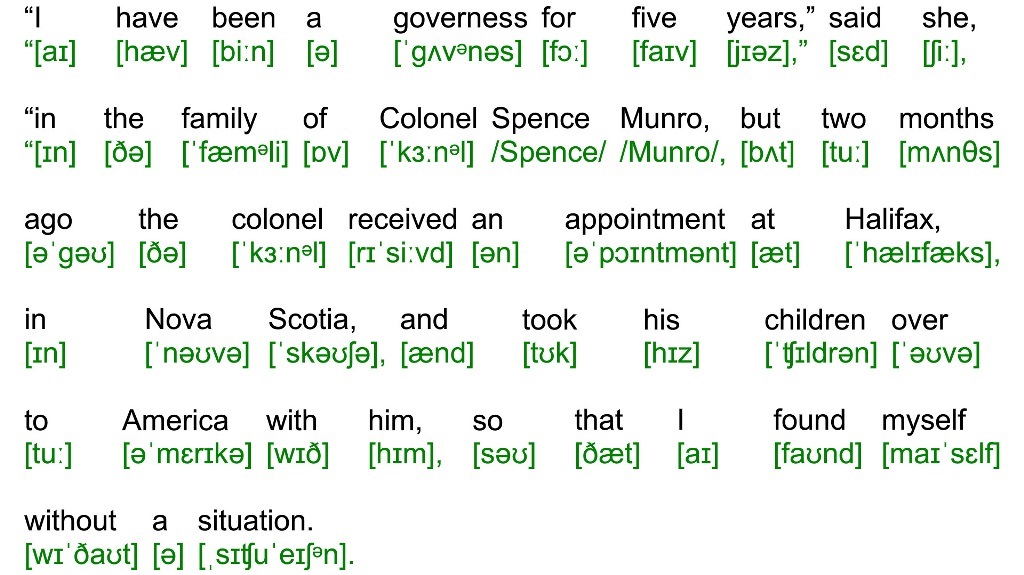
“I have been a governess for five years,” said she, “in the family of Colonel Spence Munro, but two months ago the colonel received an appointment at Halifax, in Nova Scotia, and took his children over to America with him, so that I found myself without a situation.
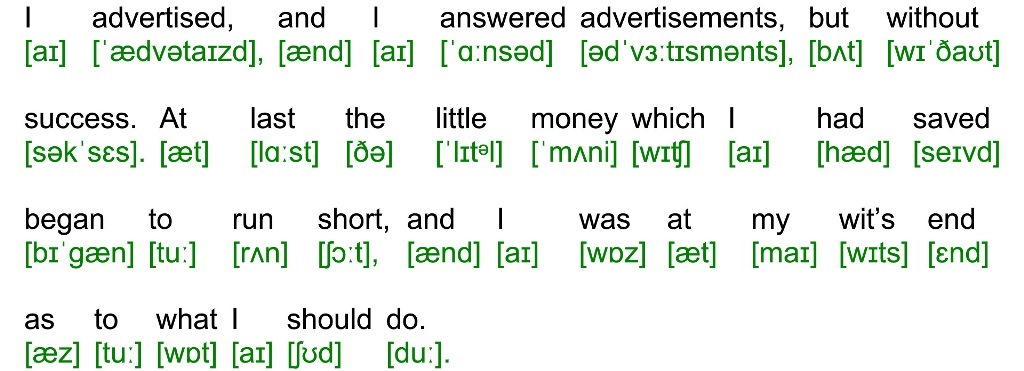
I advertised, and I answered advertisements, but without success. At last the little money which I had saved began to run short, and I was at my wit’s end as to what I should do.
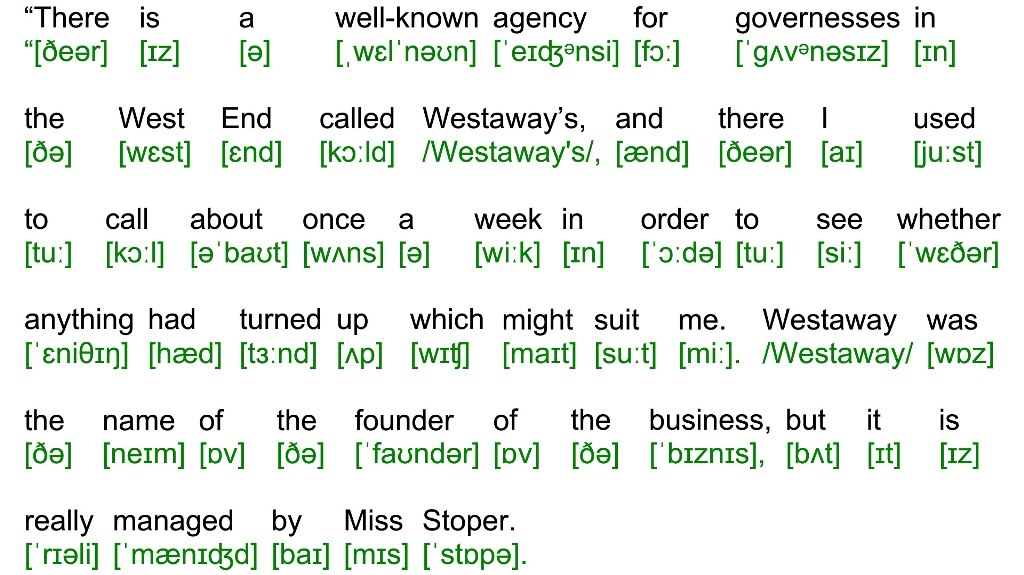
“There is a well-known agency for governesses in the West End called Westaway’s, and there I used to call about once a week in order to see whether anything had turned up which might suit me. Westaway was the name of the founder of the business, but it is really managed by Miss Stoper.
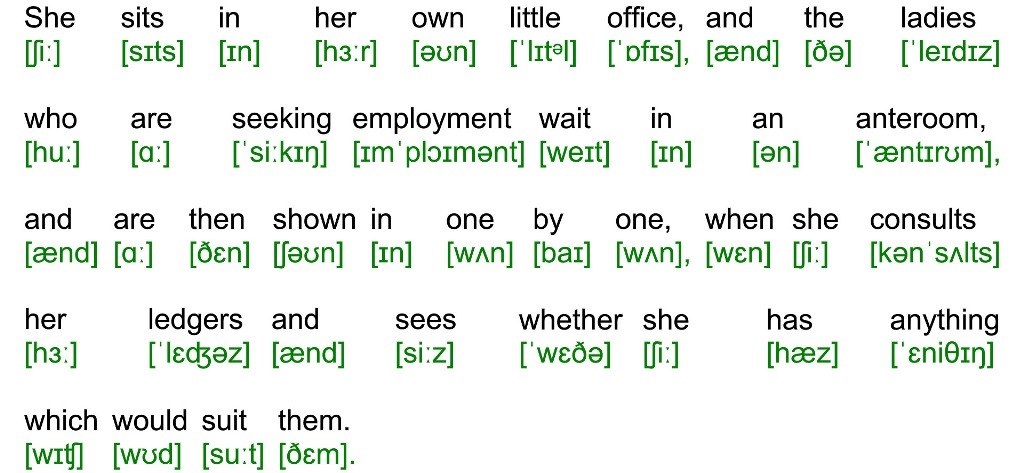
She sits in her own little office, and the ladies who are seeking employment wait in an anteroom, and are then shown in one by one, when she consults her ledgers and sees whether she has anything which would suit them.
08. 00:07:59 – 00:09:02

“Well, when I called last week I was shown into the little office as usual, but I found that Miss Stoper was not alone.
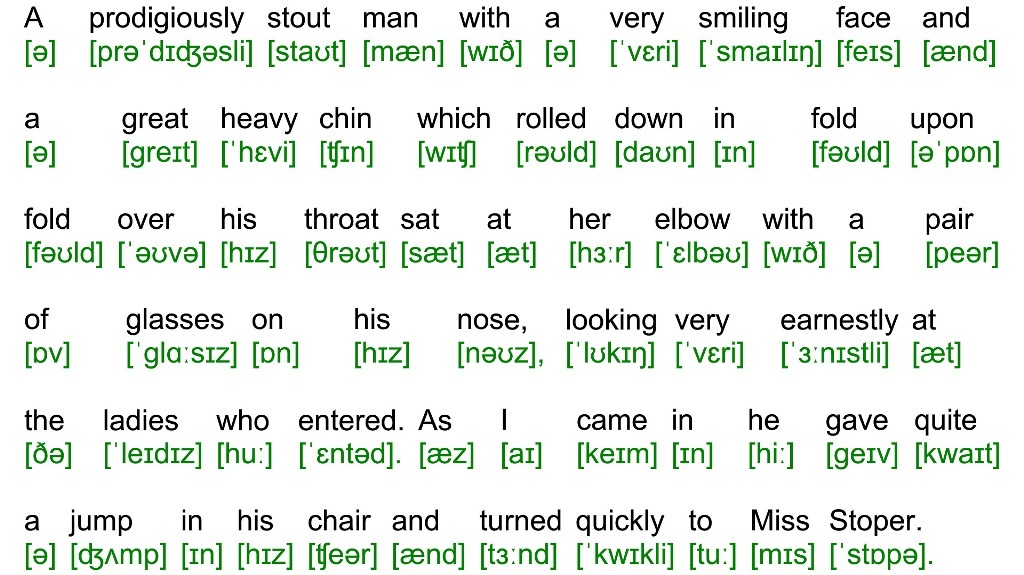
A prodigiously stout man with a very smiling face and a great heavy chin which rolled down in fold upon fold over his throat sat at her elbow with a pair of glasses on his nose, looking very earnestly at the ladies who entered. As I came in he gave quite a jump in his chair and turned quickly to Miss Stoper.

“‘That will do,’ said he; ‘I could not ask for anything better. Capital! capital!’ He seemed quite enthusiastic and rubbed his hands together in the most genial fashion. He was such a comfortable-looking man that it was quite a pleasure to look at him.
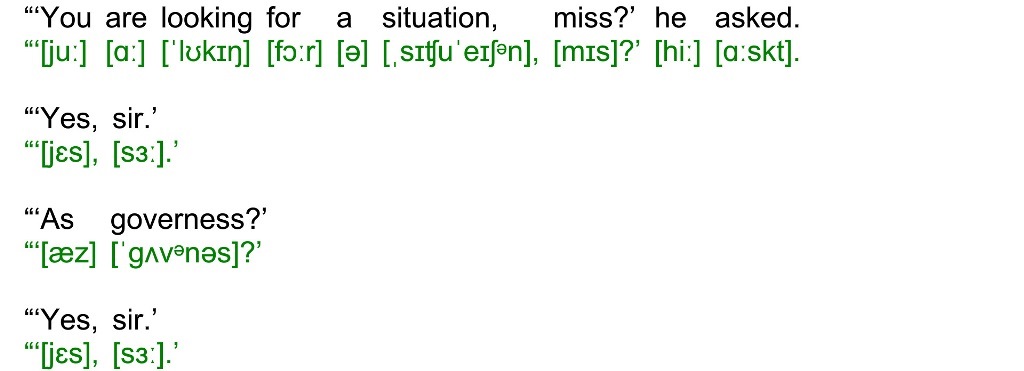
“‘You are looking for a situation, miss?’ he asked.
“‘Yes, sir.’
“‘As governess?’
“‘Yes, sir.’

“‘And what salary do you ask?’
“‘I had £ 4 a month in my last place with Colonel Spence Munro.’
09. 00:09:02 – 00:10:19

“‘Oh, tut, tut! sweating— rank sweating!’ he cried, throwing his fat hands out into the air like a man who is in a boiling passion. ‘How could anyone offer so pitiful a sum to a lady with such attractions and accomplishments?’
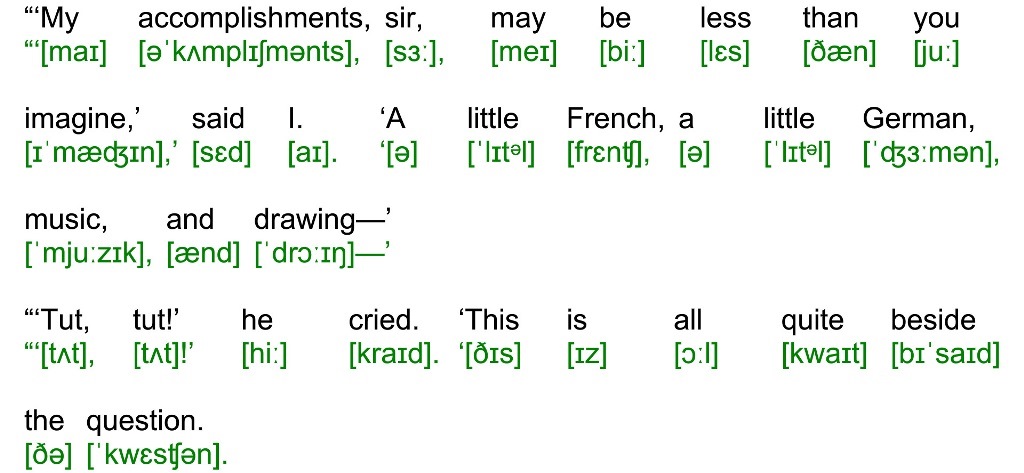
“‘My accomplishments, sir, may be less than you imagine,’ said I. ‘A little French, a little German, music, and drawing—’
“‘Tut, tut!’ he cried. ‘This is all quite beside the question.
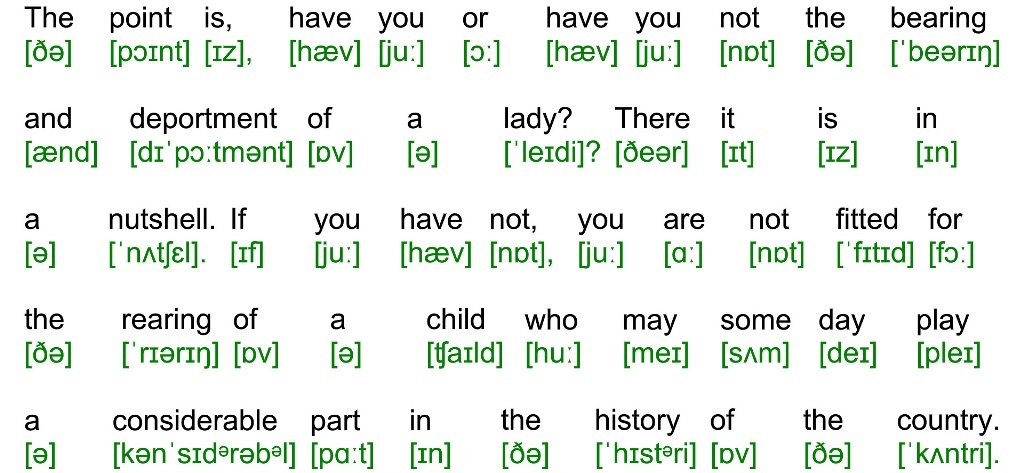
The point is, have you or have you not the bearing and deportment of a lady? There it is in a nutshell. If you have not, you are not fitted for the rearing of a child who may some day play a considerable part in the history of the country.
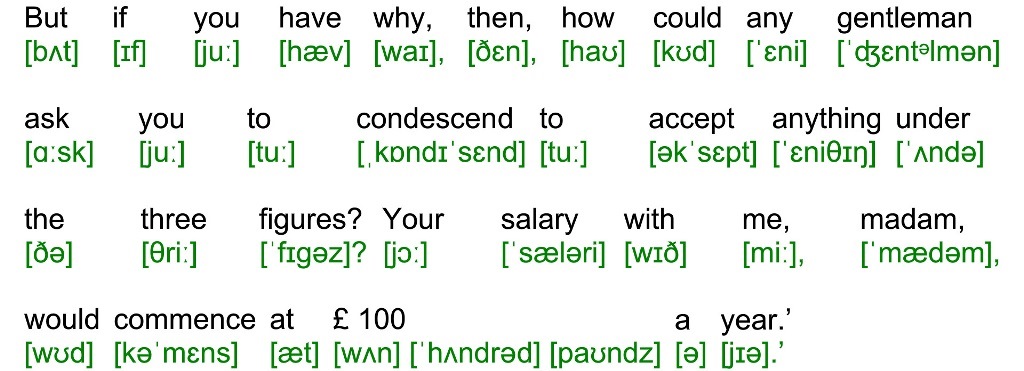
But if you have why, then, how could any gentleman ask you to condescend to accept anything under the three figures? Your salary with me, madam, would commence at £ 100 a year.’
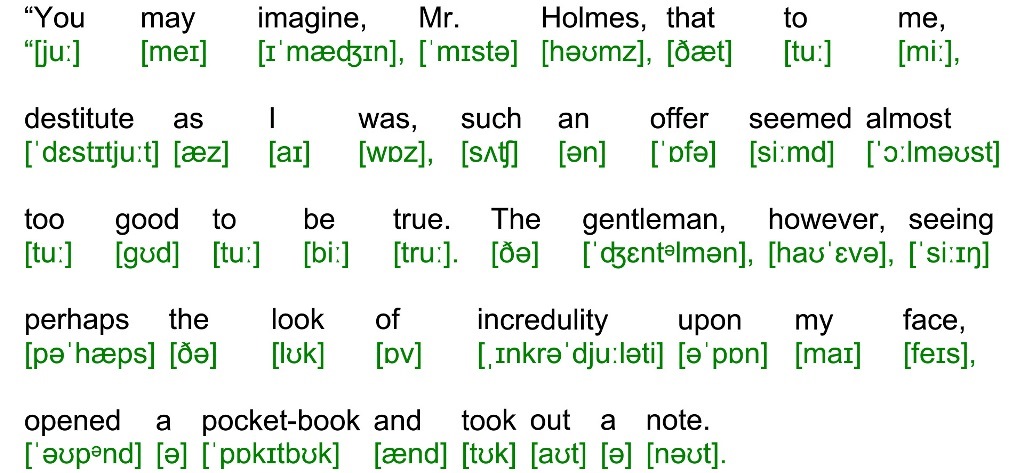
“You may imagine, Mr. Holmes, that to me, destitute as I was, such an offer seemed almost too good to be true. The gentleman, however, seeing perhaps the look of incredulity upon my face, opened a pocket-book and took out a note.
10. 00:10:19 – 00:11:39
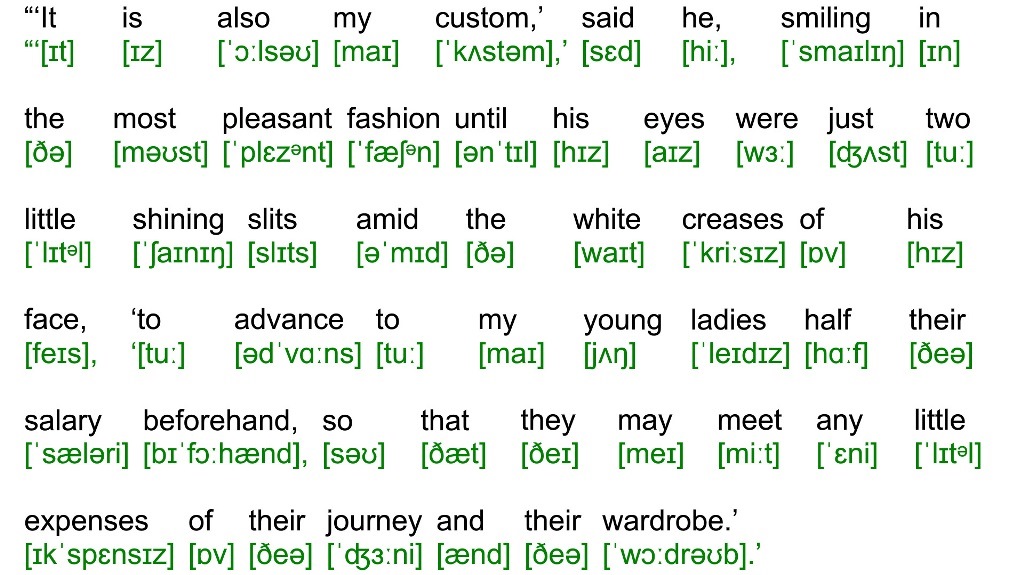
“‘It is also my custom,’ said he, smiling in the most pleasant fashion until his eyes were just two little shining slits amid the white creases of his face, ‘to advance to my young ladies half their salary beforehand, so that they may meet any little expenses of their journey and their wardrobe.’
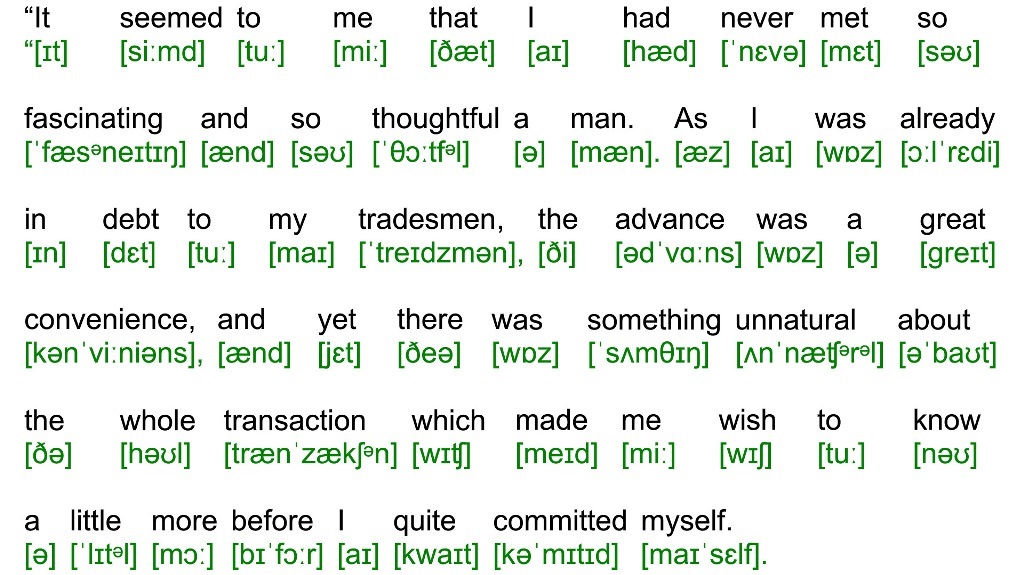
“It seemed to me that I had never met so fascinating and so thoughtful a man. As I was already in debt to my tradesmen, the advance was a great convenience, and yet there was something unnatural about the whole transaction which made me wish to know a little more before I quite committed myself.
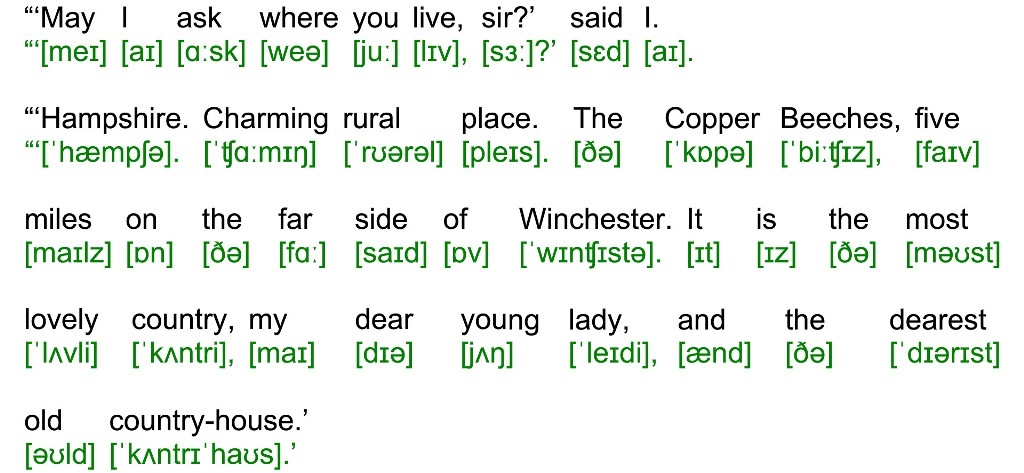
“‘May I ask where you live, sir?’ said I.
“‘Hampshire. Charming rural place. The Copper Beeches, five miles on the far side of Winchester. It is the most lovely country, my dear young lady, and the dearest old country-house.’

“‘And my duties, sir? I should be glad to know what they would be.’

“‘One child— one dear little romper just six years old. Oh, if you could see him killing cockroaches with a slipper! Smack! smack! smack! Three gone before you could wink!’ He leaned back in his chair and laughed his eyes into his head again.
11. 00:11:39 – 00:12:47
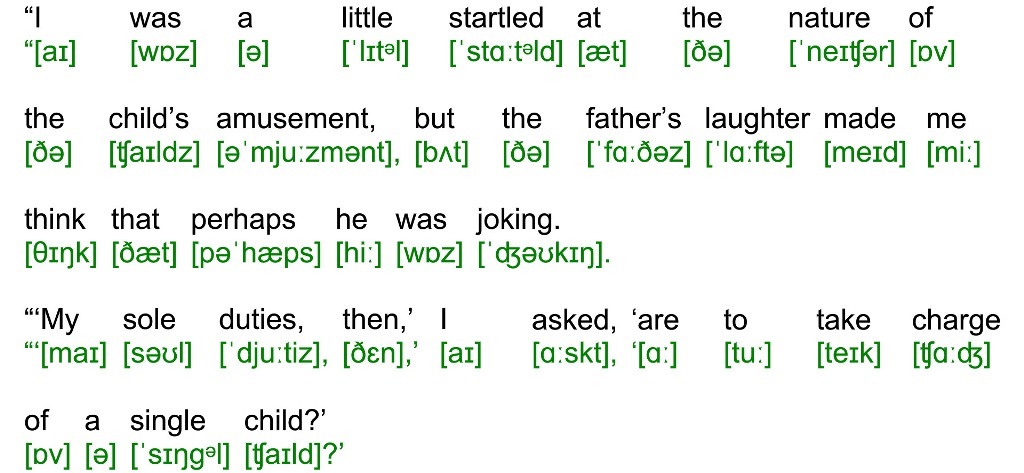
“I was a little startled at the nature of the child’s amusement, but the father’s laughter made me think that perhaps he was joking.
“‘My sole duties, then,’ I asked, ‘are to take charge of a single child?’

“‘No, no, not the sole, not the sole, my dear young lady,’ he cried.
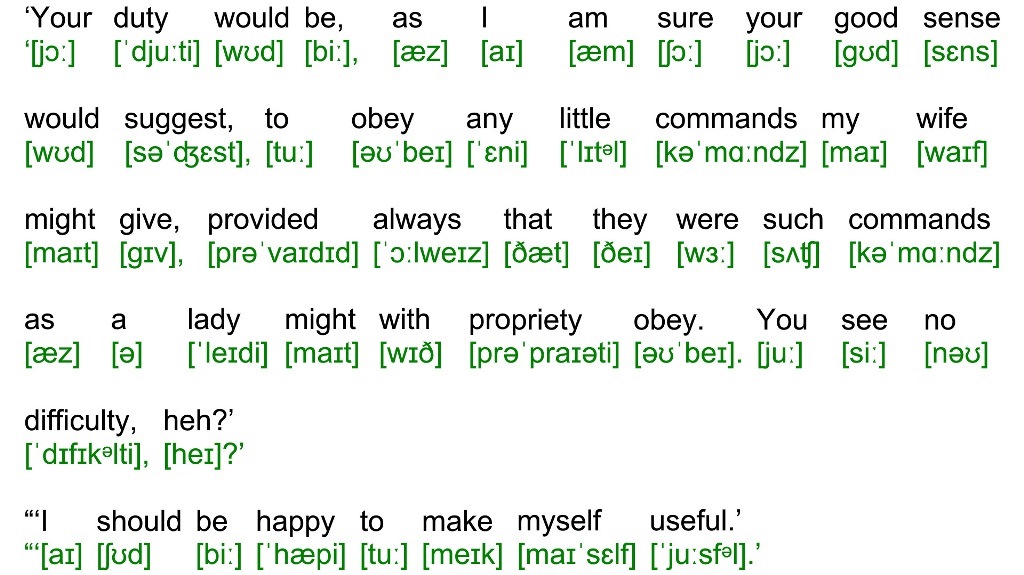
‘Your duty would be, as I am sure your good sense would suggest, to obey any little commands my wife might give, provided always that they were such commands as a lady might with propriety obey. You see no difficulty, heh?’
“‘I should be happy to make myself useful.’
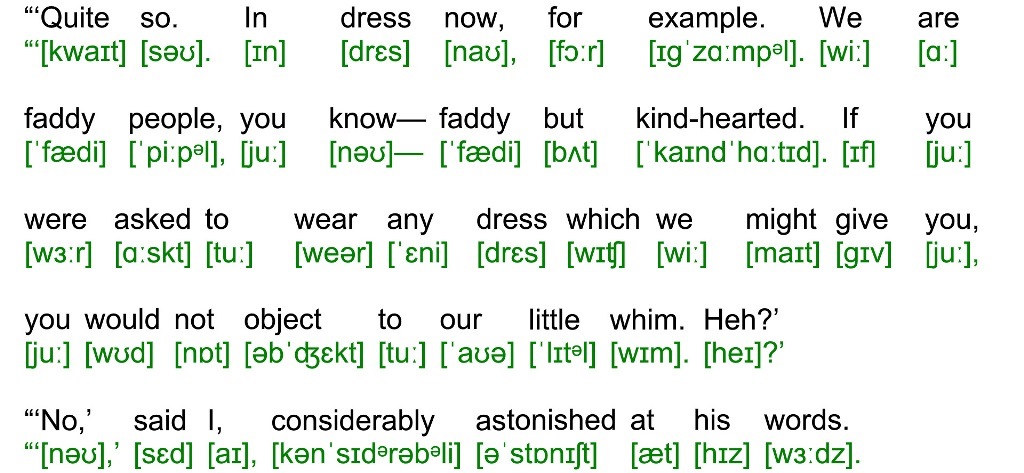
“‘Quite so. In dress now, for example. We are faddy people, you know— faddy but kind-hearted. If you were asked to wear any dress which we might give you, you would not object to our little whim. Heh?’
“‘No,’ said I, considerably astonished at his words.
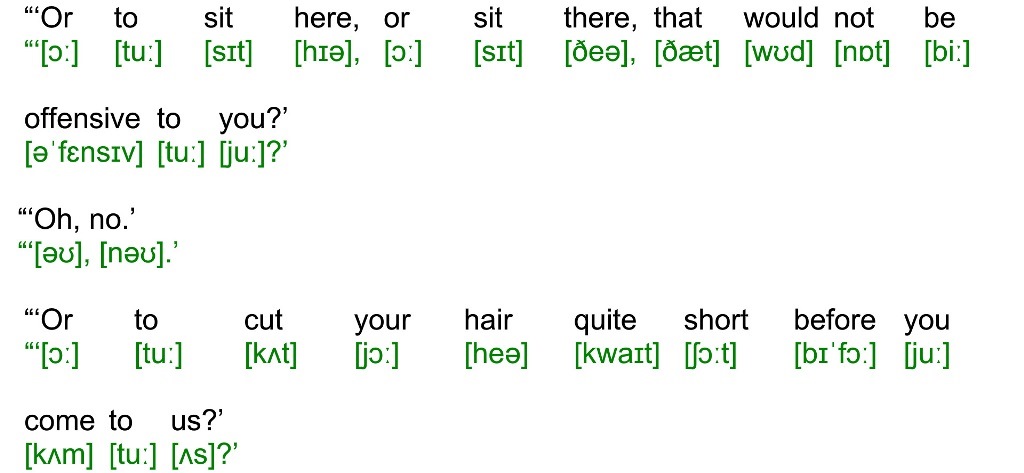
“‘Or to sit here, or sit there, that would not be offensive to you?’
“‘Oh, no.’
“‘Or to cut your hair quite short before you come to us?’
12. 00:12:47 – 00:14:01
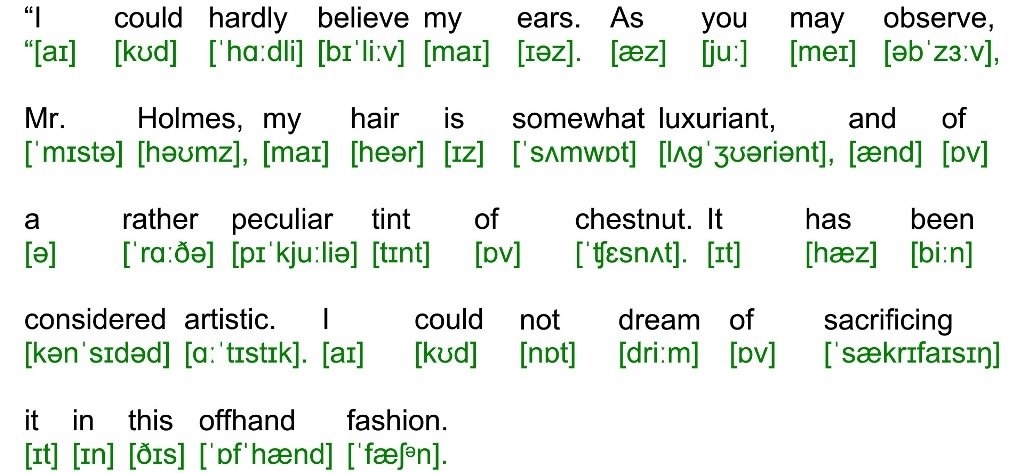
“I could hardly believe my ears. As you may observe, Mr. Holmes, my hair is somewhat luxuriant, and of a rather peculiar tint of chestnut. It has been considered artistic. I could not dream of sacrificing it in this offhand fashion.
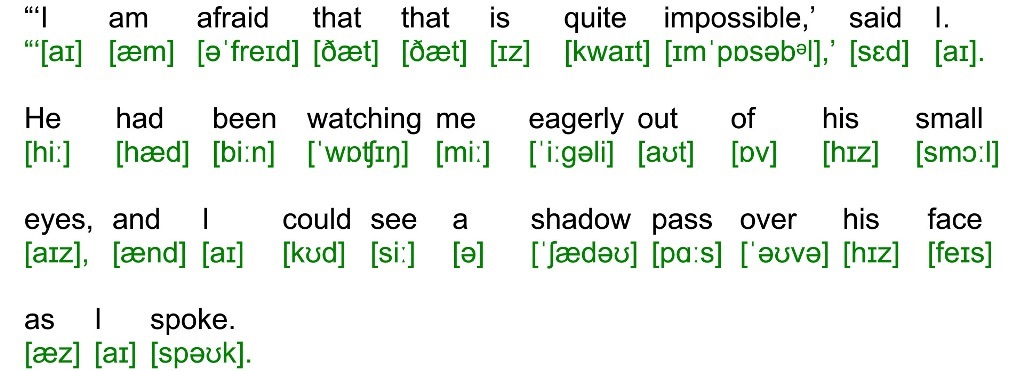
“‘I am afraid that that is quite impossible,’ said I. He had been watching me eagerly out of his small eyes, and I could see a shadow pass over his face as I spoke.
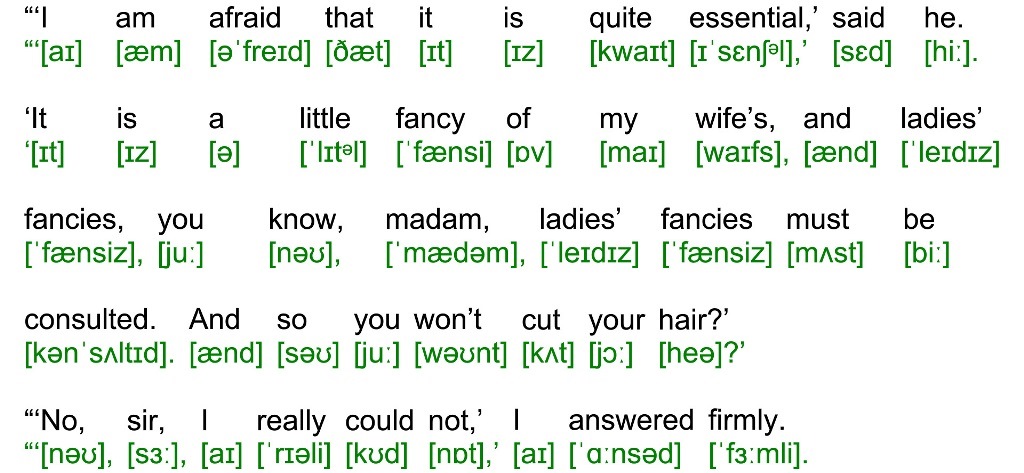
“‘I am afraid that it is quite essential,’ said he. ‘It is a little fancy of my wife’s, and ladies’ fancies, you know, madam, ladies’ fancies must be consulted. And so you won’t cut your hair?’
“‘No, sir, I really could not,’ I answered firmly.
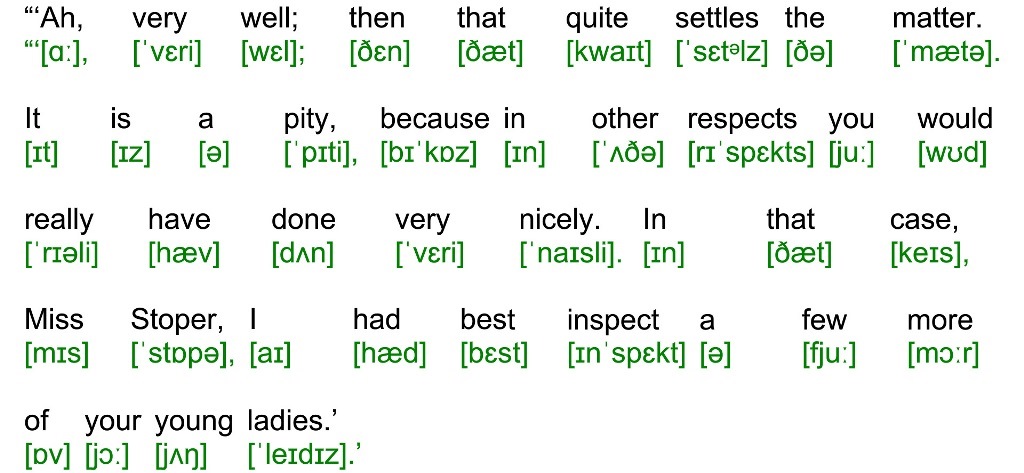
“‘Ah, very well; then that quite settles the matter. It is a pity, because in other respects you would really have done very nicely. In that case, Miss Stoper, I had best inspect a few more of your young ladies.’
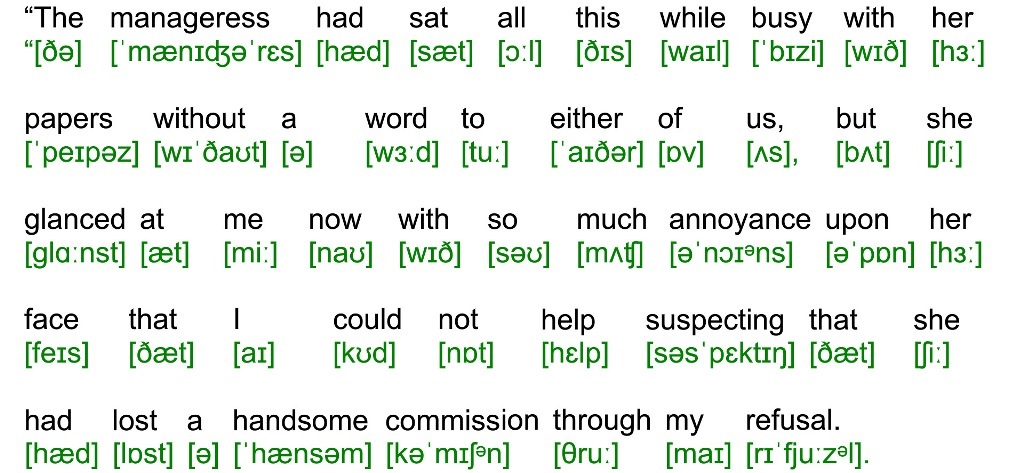
“The manageress had sat all this while busy with her papers without a word to either of us, but she glanced at me now with so much annoyance upon her face that I could not help suspecting that she had lost a handsome commission through my refusal.
Конец ознакомительного фрагмента.
Текст предоставлен ООО «Литрес».
Прочитайте эту книгу целиком, купив полную легальную версию на Литрес.
Безопасно оплатить книгу можно банковской картой Visa, MasterCard, Maestro, со счета мобильного телефона, с платежного терминала, в салоне МТС или Связной, через PayPal, WebMoney, Яндекс.Деньги, QIWI Кошелек, бонусными картами или другим удобным Вам способом.


